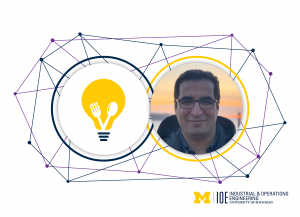Presented By: Industrial & Operations Engineering
IOE Lunch & Learn Seminar Series: Esmaeil Keyvanshokooh, U-M IOE
Contextual Learning with Online Convex Optimization: Theory and Applications to Chronic Diseases

This event is open to all IOE PhD students, faculty, and staff. Lunch will be provided. In order to get an accurate count for food, please RSVP by Wednesday, October 30, 2019.
Title:
Contextual Learning with Online Convex Optimization: Theory and Applications to Chronic Diseases
Abstract:
Chronic diseases are the leading cause of mortality and disability worldwide, requiring the surveillance and monitoring of patients to assess disease progression and determine if a treatment is warranted. Even when a suitable treatment is prescribed, dosing it correctly remains a significant challenge because proper dosage is highly volatile among patients. This involves adaptively learning a personalized disease progression control model conditional on patient-specific contextual information. We formulate this as a new contextual multi-armed bandit under a two-dimensional patient-specific control with a nested structure, which sequentially selects both treatment and corresponding dosage based on contextual information of patients, with the goal of minimizing disease progression risk. We develop contextual learning and optimization algorithms that integrate the strength of contextual bandit learning with online convex optimization. Comparing with the clairvoyant optimal policy, we prove a T-period regret, which is provably tight up to a logarithmic factor. We illustrate the effectiveness of our methodology by using case data on patients with type 2 diabetes. We believe that our contextual learning and optimization framework could be widely used in many other service systems.
Bio:
Esmaeil Keyvanshokooh is a PhD candidate in Operations Research at the Industrial and Operations Engineering department of the University of Michigan. His main research interests have broadly focused on developing efficient and effective data-driven algorithms with theoretical performance guarantees for several core problems in healthcare operations and medical decision making. Methodologically, he focuses on statistical machine learning algorithms such as contextual multi armed bandits, online convex optimization, and reinforcement learning. For applications, he focuses on online resource allocation for healthcare operations, readmission problem, managing chronic disease progression, and personalized medicine.
Title:
Contextual Learning with Online Convex Optimization: Theory and Applications to Chronic Diseases
Abstract:
Chronic diseases are the leading cause of mortality and disability worldwide, requiring the surveillance and monitoring of patients to assess disease progression and determine if a treatment is warranted. Even when a suitable treatment is prescribed, dosing it correctly remains a significant challenge because proper dosage is highly volatile among patients. This involves adaptively learning a personalized disease progression control model conditional on patient-specific contextual information. We formulate this as a new contextual multi-armed bandit under a two-dimensional patient-specific control with a nested structure, which sequentially selects both treatment and corresponding dosage based on contextual information of patients, with the goal of minimizing disease progression risk. We develop contextual learning and optimization algorithms that integrate the strength of contextual bandit learning with online convex optimization. Comparing with the clairvoyant optimal policy, we prove a T-period regret, which is provably tight up to a logarithmic factor. We illustrate the effectiveness of our methodology by using case data on patients with type 2 diabetes. We believe that our contextual learning and optimization framework could be widely used in many other service systems.
Bio:
Esmaeil Keyvanshokooh is a PhD candidate in Operations Research at the Industrial and Operations Engineering department of the University of Michigan. His main research interests have broadly focused on developing efficient and effective data-driven algorithms with theoretical performance guarantees for several core problems in healthcare operations and medical decision making. Methodologically, he focuses on statistical machine learning algorithms such as contextual multi armed bandits, online convex optimization, and reinforcement learning. For applications, he focuses on online resource allocation for healthcare operations, readmission problem, managing chronic disease progression, and personalized medicine.